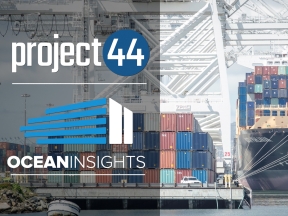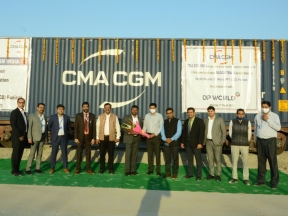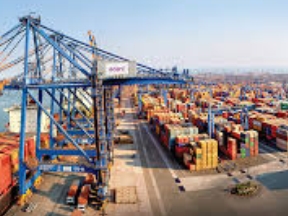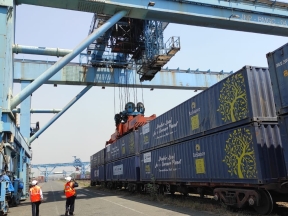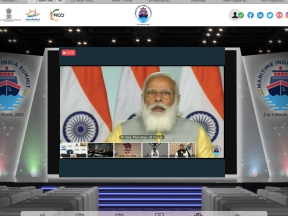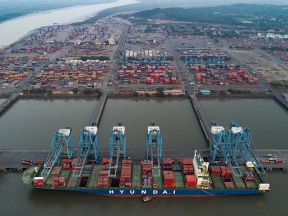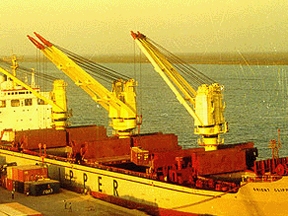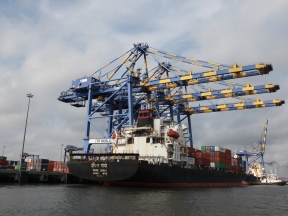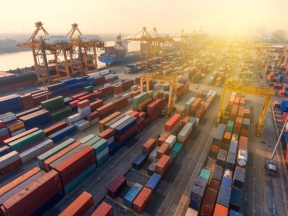project44 has announced that it has acquired Ocean Insights to expand its ocean solution by adding the broadest container tracking capabilities in the market, as well as one-of-a-kind sailing schedule and ocean analytics products; terms of the acquisition were not disclosed. Combining Ocean Insights’ tracking and analytics with the project44 platform and ecosystem establishes project44 as the clear market leader with an unrivaled set of multi-modal solutions for end-to-end supply chain visibility. Surging global trade since the outset of the pandemic has resulted in massive disruptions in the global supply chain. Since March 2020, freight rates increased by as much as 174 per cent due to the increased global demand for electronics, PPE goods and stay-at-home consumer products. At the same time, COVID-19 and other restrictions have caused significant port congestions, and rollover percentages have never been higher. To meet these global challenges and build resilience, supply chain leaders are adopting global freight visibility and digitalisation. Headquartered in Germany and founded in 2012, Ocean Insights pioneered ocean freight visibility by combining carrier data, live vessel tracking and sailing schedule data in one data-rich platform. Tracking 350,000 containers daily, Ocean Insights provides track and trace functionality across the vast majority of shipping lines, 700 seaports, and more than 5,000 vessels as well as handling over five million sailing schedule changes per day. “Ocean freight is a linchpin for global supply chains. For organisations shipping internationally, the lack of ocean visibility can start a costly domino effect throughout the supply chain,” said Jett McCandless, Founder and CEO of project44. “Ocean Insights has dominated the container tracking space and we look forward to providing the industry not only the best ocean capabilities, but …
Read More »DP World and CMA CGM Group launch the first block train between Mundra and Panipat
DP World and CMA CGM jointly received their maiden Block Train from Mundra, Gujarat to DP World PFT (ICD) Panipat, Haryana. This new service is the first block train by a shipping line between Mundra and Panipat. The fully loaded 90-TEU train was flagged off from Mundra port on February 27, 2021. The service was received in the presence of representatives from DP World and CMA CGM India. The dedicated connections between the Port of Mundra and the inland container depot of Panipat will provide dedicated and seamless connection from Mundra Port to PFT (ICD) Panipat, thereby, making customers’ cargo reach internal markets faster. With priority rail out option and fixed train schedule, customers will be able to minimise waiting time at the Port as well as plan their cargo movements effectively. Train will depart Mundra Port on Saturday/Sunday. Ranadhir Reddy, CEO, Rail & PFT, Subcontinent, DP World said, “At DP World, it is our constant endeavors to offer bespoke solutions to our customers to solve their supply chain challenges and support their strategic growth ambitions. Our pan India network provides seamless connectivity that helps customers connect their cargo to global markets as well as across India’s vast hinterland. Through our investments, we are committed to enhance India’s rail freight share and offer trade solutions using multimodal logistics.” Atit Mahajan, General Manager, CMA CGM India, declares, “We are pleased to be the first shipping line to offer a block train service between Mundra and Panipat in collaboration with DP World. This service is the 10th dedicated block train service being operated by the CMA CGM Group in India. This service will provide a dedicated and direct loop from port to …
Read More »Adani Ports to acquire 31.5% in Gangavaram Port from Warburg Pincus for Rs 1,954 crore
The Adani Ports and Special Economic Zones (APSEZ) is acquiring the 31.5 per cent stake held by Windy Lakeside Investment (an affiliate of Warburg Pincus) in Gangavaram Port (GPL). The acquisition is valued at Rs 1,954 crore and subject to regulatory approvals. GPL is located in the northern part of Andhra Pradesh next to Vizag Port. It is the second largest non-major port in Andhra Pradesh with a 64 MMT capacity established under concession from Government of Andhra Pradesh (GoAP) that extends till 2059. It is an all-weather, deep water, multi-purpose port capable of handling fully laden super cape size vessels of up to 200,000 DWT. Currently, GPL operates 9 berths and has free hold land of ~1,800 acres. With a master plan capacity for 250 MMTPA with 31 berths, GPL has sufficient headroom to support future growth. GPL handles a diverse mix of dry and bulk commodities including Coal, Iron Ore, Fertilizer, Limestone, Bauxite, Sugar, Alumina, and Steel. GPL is the gateway port for a hinterland spread over 8 states across eastern, western, southern and central India. In FY20, GPL had a cargo volume of 34.5 MMT, generated revenue of INR 1,082 crore, EBITDA of INR 634 crore (margin of 59%) and PAT of Rs 516 crore GPL is debt free with cash balance of over INR 500 crore. The Company has a paid up equity share capital of 51.7 crore shares of which 58.1% is owned by DVS Raju and Family (Promoter), 10.4% by Government of Andhra Pradesh and 31.5% by Warburg Pincus. APSEZ is acquiring the Warburg Pincus stake of ~16.3 crore shares (31.5%) at Rs 120/share which works out to a consideration of Rs 1,954 crore. …
Read More »Indian Railways conduct successful trial run of double stacked dwarf container train to JN Port
Railways undertook a successful trial run of double stacked dwarf container train from Mehsana (Gujarat) to JN Port on March 3, 2021. The ‘dwarf’ containers provides 67 per cent increase in volume when double-stacked and can carry a weight of 71 tons, against 40 tons by an ISO container. Indian Railways has given 17 per cent discount on haulage cost for double stack dwarf container trains compared to double stack ISO container trains coupled with additional volume benefit. JN Port is in the process of finalising an Operator for “Management, Maintenance and Operation of Dedicated Dwarf Container Depot (D-Depot) inside the Port area at JNPT”. Inside the D-Depot, ISO EXIM containers will be destuffed/restuffed and then re-stuffed in Dwarf Containers for further movement on rail to and from JN Port. The train with five wagons of double stacked dwarf containers arrived at 11:30 hours and departed at 13:00 hours. The concept of Dwarf container would be game changer as the rail movement of EXIM cargo through double stacked dwarf containers would significantly provide cost advantage to the customers and enhance rail traffic at JN Port.
Read More »PM invites foreign investments in India, to be part of India’s growth trajectory
Prime Minister Narendra Modi has invited the world to come to India and be a part of India’s growth trajectory. India is very serious about growing in the maritime sector and emerging as a leading Blue Economy of the world. Through the focus areas of upgradation of infrastructure, boosting reform journey, India aims to strengthen the vision of Aatamnirbhar Bharat, he said. Prime Minister has inaugurated the ‘Maritime India Summit 2021’ through video conferencing. He noted that instead of a piecemeal approach focus is on the entire sector as one. He informed that capacity of major ports have increased from 870 million tonnes in 2014 to 1550 million tonnes now. Indian ports now have measures such as Direct port Delivery, Direct Port Entry and an upgraded Port Community System (PCS) for easy data flow. Our ports have reduced waiting time for inbound and outbound cargo. He also informed that mega ports with world class infrastructure are being developed in Vadhavan, Paradip and Deendayal Port in Kandla. The Prime Minister asserted that “Ours is a Government that is investing in waterways in a way that was never seen before. Domestic waterways are found to be cost effective and environment friendly ways of transporting freight. We aim to operationalise 23 waterways by 2030.” He also pointed out that India has as many as 189 lighthouses across its vast coastline. “We have drawn up a programme for developing tourism in the land adjacent to 78 lighthouses. The key objective of this initiative is to enhance development of the existing lighthouses and its surrounding areas into unique maritime tourism landmarks”, Shri Modi informed. He announced that steps are also being taken to introduce urban …
Read More »JNPT signs over 30 MoUs to strengthen port-led industrialization in India
Jawaharlal Nehru Port Trust (JNPT) has signed over 30 MOUs (Memorandum of Understanding) with potential investors for port projects, technology transfer and development of plots in JNPT SEZ for an amount of around Rs27000 crore. The MoU was signed by Sanjay Sethi, IAS, Chairman, JNPT in presence of Unmesh Wagh, IRS, Deputy Chairman, JNPT. The investments by DP World, JM Baxi & Co., Ganesh Benzo, BPCL, NITIE, SS G Pharma, Sooraj Agro, JWR Logistic, Cineline India are some of the companies that have signed MoUs towards Manufacturing, IT services, Warehousing/Cold Storage, FTWZ, Pharma, Confectionary Manufacturing, Engineering Services, Food Processing. Speaking on the occasion, Sethi said, “JNPT is dedicated towards setting quality benchmarks for the port industry across the globe and we have systematically invested in improving the port’s operating efficiency and handling capacity to enable seamless trade escalating its growth trajectory. We have signed over 30 MoUs with various companies at the ‘Maritime India summit’. This will help establish JNPT as one of the premier investment destinations in the country, as we continue to remain an attractive investment destination even after the impact of COVID -19 across the globe. Even during these trying times, JNPT has attracted around Rs27,000 crore worth of new investments. The signing of the MoUs will provide vast employment opportunities and various benefits to the EXIM Trade. Additionally, this will open opportunities within India and in the international coastal lines.”
Read More »Deendayal Port crosses 100 Million Metric Tonne mark in cargo handling
Deendayal Port, one of the 12 major ports in the country has crossed the 100 million tonne mark in cargo handling. Mansukh Mandaviya Ports, Union Minister of Shipping and Waterways termed it a significant indication that the economy is bouncing back to pre-COVID times. “Deendayal Port Trust, one of the 12 Major Ports of India, has crossed 100 MMT (Million Metric Tonne) in cargo handling. Deendayal Port, erstwhile known as Kandla Port, is situated in Kutch, Gujarat,” Ministry of Ports, Shipping and Waterways said in a statement. The port handled 13.25 MMT of liquid cargo and 43.76 MMT of dry cargo & containers at Kandla. It also handled 43.30 MMT at Vadinar (which includes transhipment), the containerised cargo crossed 4.50 lakh TEU during this period, grossing a total of 100 MMT overall. Major commodities handled by the Deendayal Port are crude oil, petroleum products, coal, salt, edible oil, fertilizer, sugar, timber, soya bean and wheat. The achievement can be attributed to the user-friendly approach of port with the shipping fraternity / stakeholders and constant consultations with them to improve ease of doing business.
Read More »DP World Cochin records highest ever monthly volume of over 70,000 TEUs, completes 10 years
DP World operated International Container Transshipment Terminal (ICTT) at Cochin has completed 10 glorious years as partner in India’s trade growth. This milestone comes with the terminal achieving its all-time highest monthly throughput of more than 70,000 TEUs in January 2021, registering a 36% Year-on-Year growth over January 2020. ICTT is India’s first transshipment hub strategically located in close proximity to major global east-west trade routes. Since inception, the terminal has handled 4.68 million TEUs and 5,661 vessel calls including 1,858 Mainline vessel calls. In 2020, despite major business disruptions, DP World Cochin handled 6.31 lakh TEUs, registering marginal decline of -0.35% over 2019 volumes while South India market collectively registered an average degrowth of -11.2%. ICTT has played a key role in making Cochin a strategic hub to enhance trade in the South India Region. The terminal provides fast and reliable connectivity to hinterland through multimodal transportation including rail and inland waterways. Cargoes from all industrial clusters in Kerala and the major ones in Tamil Nadu (like Coimbatore, Pollachi and other hubs) can reach the terminal within six hours. In 2020, DP World Cochin launched a direct weekly rail connection to Bangalore. This resulted in an impressive five-fold increase in rail volumes. DP World Cochin offers various direct connections to Europe, the Mediterranean, the Fareast, South East Asia and the Middle East. Thereby, providing reduced transit time, cost and reliable reach to global markets. In 2020, the terminal handled 42 per cent of EXIM cargo on mainline vessels positioning Cochin as port of choice for customers. The terminal continues to be highly efficient and productive with truck turnaround time at an average of 27 minutes, and an average Gross …
Read More »Cargo traffic at 12 major ports drops by 7% during Apr-Jan
According to ports’ apex body IPA, India’s top-12 ports witnessed a considerable decline in cargo traffic for the tenth straight month in January to 542.13 million tonnes (MT). Cargo traffic at 12 major ports that are under the control of the Centre dropped by 7.44 per cent to 542.13 million tonnes (MT) during April-January this fiscal, compared with 585.73 MT in the year-ago period. Mansukh Mandaviya, Ports, Shipping and Waterways Minister said the cargo traffic at 12 major ports declined considerably March onwards due to the adverse impact of the COVID-19 pandemic. All ports, barring Paradip and Mormugao — which recorded 0.24 per cent and 28.12 per cent increase in cargo handling to 93.60 MT and 17.19 MT respectively, saw negative growth. Cargo handling at Kamrajar Port (Ennore) nosedived 25.94 per cent during April-January to 19.66 MT, while ports like Mumbai and Chennai saw their cargo volumes dropping by over 12 per cent during the said period. Cochin and V.O. Chidambaranar ports suffered a sharp decline of over 11 per cent. JNPT saw a decline of 9.76 per cent in cargo volumes, while Deendayal Port Trust, New Mangalore and Kolkata ports saw over 6 per cent drop in cargo volume. Cargo handling at Visakhapatnam slipped 4.36 per cent. India has 12 major ports under the control of the central government — Deendayal (erstwhile Kandla), Mumbai, JNPT, Mormugao, New Mangalore, Cochin, Chennai, Kamarajar (earlier Ennore), V. O. Chidambaranar, Visakhapatnam, Paradip and Kolkata (including Haldia). In the wake of the COVID-19 pandemic, sharp declines were witnessed in the handling of containers, coal and POL (petroleum, oil and lubricant), among other commodities. These ports handle about 61 per cent of the country’s total …
Read More »Adani Ports acquires Dighi Port; earmarks Rs 10,000 crore to build new gateway into Maharashtra
Adani Ports and Special Economic Zone completed the acquisition of 100 per cent stake at Dighi Port (DPL) for Rs 705 crore. The company had intimated the commencement of this development to stock exchanges on March 6, 2020. DPL, the 12th port to join APSEZ’s string of economic gateways across the eastern and western coast of India would establish the company’s footprint in Maharashtra, the largest contributor to India’s GDP. This would enable APSEZ to service customers in Maharashtra which includes the highly industrial areas and development in the Mumbai & Pune regions. APSEZ plans to invest over Rs 10,000 crore to develop the port into a multi-cargo port with world class infrastructure as well as investing in the development of rail & road evacuation infrastructure for seamless and efficient cargo movement. The company will strengthen and repair existing infrastructure and invest in development of facilities for dry, container, and liquid cargo. DPL will evolve as an alternative gateway to JNPT and will invite and support the development of port-based industries on port land. The development of DPL will lead to further investments across various industries such as consumer appliances, metals, energy, petrochemicals, and chemicals business in Maharashtra and provide a tremendous fillip to the industrial development and growth in Maharashtra. These investments will contribute to employment generation and socio-economic development of the port’s hinterland. As per the terms & requirements of the Resolution Plan, the transfer of concession rights has also been approved by the Maharashtra Maritime Board (‘MMB’) and APSEZ has settled the dues of financial creditors, MMB, and other admitted costs and claims. Karan Adani, CEO and Whole Time Director of APSEZ said, “The successful acquisition of …
Read More » Cargo Breaking News
Cargo Breaking News
